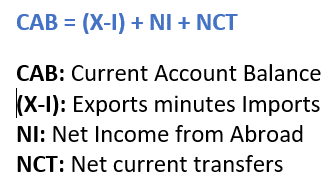Analysing the Impact of the Current Account Balance on Global Economies”
Current Account balance definition
The current account balance is comprised of a country’s exports minus imports, net income from abroad and net current transfers.
Current Account balance formula

The current account balance is the sum of the following components:
- Net Exports (Exports minus Imports): the difference between exports and imports is called the trade balance of net exports. A trade deficit is defined when imports are greater than exports. If exports are greater than imports this is called a trade surplus
- Net income from abroad: Net income from abroad is cash flows received from abroad minus cash flows sent aboard. Cash flows can be from: investment income and service transactions
- Net current transfers: Net current transfers include foreign aid and pensions.
The current account balance shows whether the country’s private and government sectors are increasing or decreasing their claims on foreign wealth. A current account surplus means that the country is providing goods and resources to other economies, and is owed funds in return.
A current account deficit indicates that the country is reducing its holdings of foreign assets and that foreign countries are increasing their claims on the country. The country is consuming or investing more than it is saving. The economy is using resources from other economies to meet its consumption and investment requirements.
Current account deficits are not always bad if the specific country is using the funds efficiently to increase its productivity and increase investment income in the long-term. If however, current account deficits are used to finance consumption then this is problematic.
A current account surplus indicates that a country is increasing its claims on foreign assets.